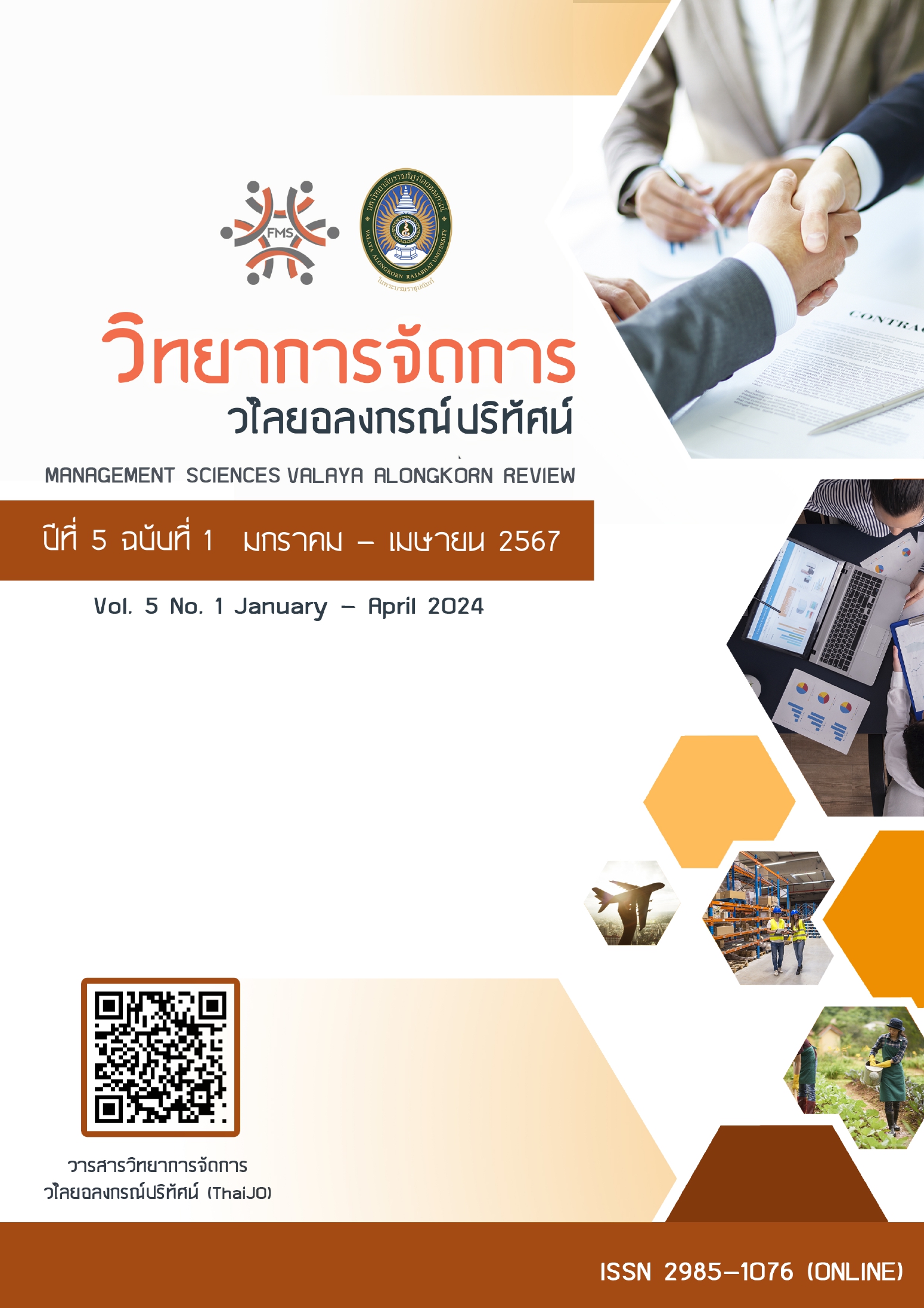INFLUENCE OF CHARACTERISTICS ON ENTREPRENEURIAL INTENTION: A CASE STUDY OF FACULTY OF BUSINESS ADMINISTRATION AND LIBERAL ARTS RAJAMANGALA UNIVERSITY OF TECHNOLOGY LANNA TAK
Main Article Content
Abstract
The purposes of this research were 1) to study about broad fundamental features, 2) degrees of opinions, traits, and aspirations to become an entrepreneur, and 3) variables influencing undergraduate students' ambitions to become entrepreneurs. The sample was 356 undergraduate students from the Faculty of Business Administration and Liberal Arts , derived using questionnaires. The descriptive statistics and enter multiple regression analysis were used to analyze data.
The study findings revealed that 1) the majority of informants were the first-year female students, age ranged from 21 to 23 who mostly had worked and studied at the same time and grown up from non-business owner or entrepreneur families; 2) the informants showed their entrepreneurship characteristics at a high level ( = 3.704) and their intentions on being an entrepreneur at a high level (
= 3.875); and 3) positive factors statistically influenced an entrepreneurial intention at 0.05 contained 4 variables including success determination, risk taking, tolerance for ambiguity, and creativity. Meanwhile, negative factors statistically affected at 0.01 included work experience during study and business ownership of the families.
Article Details

This work is licensed under a Creative Commons Attribution-NonCommercial-NoDerivatives 4.0 International License.
บทความ ข้อความ ภาพประกอบ และตารางประกอบที่ลงพิมพ์ในวารสารเป็นความคิดเห็นส่วนตัวของผู้นิพนธ์ ถือเป็นความรับผิดชอบของผู้นิพนธ์แต่เพียงผู้เดียว กองบรรณาธิการไม่จำเป็นต้องเห็นตามและไม่มีส่วนรับผิดชอบใด ๆ
References
กองการศึกษาตาก. (2566). จำนวนนักศึกษา. สืบค้นจาก https://tak.rmutl.ac.th.
ธนาคารกรุงเทพ จำกัด มหาชน. (2562). การเป็นผู้ประกอบการ. สืบค้นจาก https://www.bangkokbanksme.com.
บุญชม ศรีสะอาด. (2553). การวิจัยเบื้องต้น. สุวีริยาสาสน.
ภัทรานิษฐ์ สรเสริมสมบัติ. (2563). คุณลักษณะที่ส่งผลต่อความตั้งใจเป็นผู้ประกอบการ: กรณีศึกษานักศึกษาบริหารธุรกิจมหาวิทยาลัยราชภัฏเชียงใหม่. วารสารวิทยาการจัดการ มหาวิทยาลัยราชภัฎเชียงราย. 15(2), 117-142.
ภัทราพร เกษสังข์. (2559). การวิจัยปฏิบัติการ. กรุงเทพฯ: สำนักพิมพ์แห่งจุฬาลงกรณ์มหาวิทยาลัย.
อมินดารา อริยธาดา อังศินันท์ อินทรกำแหง และกฤตติพัฒน์ ชื่นพิทยาวุฒิ. (2565). รูปแบบความสัมพันธ์เชิงสาเหตุด้านคุณลักษณะทางจิตและสภาพแวดล้อมทางการศึกษาที่ส่งผลต่อพฤติกรรมการมุ่งเน้นการเป็นผู้ประกอบการ โดยส่งผ่านความตั้งใจที่จะเป็นผู้ประกอบการของนักศึกษา สาขาผู้ประกอบการ. วารสารการวัดผลการศึกษา. 39(105), 273-283.
อารยา องค์เอี่ยม และพงศ์ธารา วิจิตเวชไพศาล. (2561). การตรวจสอบคุณภาพเครื่องมือวิจัย. วิสัญญีสาร. 44(1), 36-42.
อำพล นววงศ์เสถียร ภูษิต วงษ์เล็ก ภิศาชล พรมวงษ์ กรรณิการ์ สุสม บุษยา วงษ์ชวลิตกุล และเฉลิมพร เย็นเยือก. (2564). การศึกษา ความเชื่อ แรงจูงใจ และความคิดสร้างสรรค์ที่มีผลต่อความตั้งใจในการเป็นผู้ประกอบการของนักศึกษาในสถาบันอุดมศึกษาในสังกัดเครือข่ายภาคกลางตอนบนในประเทศไทย. วารสารปรัชญาปริทรรศน์. 26(2), 1-20.
Aaker, D. A. (2013). Strategic market management. 10th Ed. New Jerseys: Wiley.
Ajzen, I. (1991). The theory of planned behavior. Organizational behavior and human decision processes. 50(2), 179-211.
Altinay, L., Madanoglu, M., Daniele, R., & Lashley, C. (2012). The Influence of Family Tradition and Psychological Traits on Entrepreneurial Intention. International Journal of Hospitality Management. 31(2), 489-499.
Bleeker, I. (2011). The Influence of Entrepreneurial Orientation on the Innovation Process: An empirical research on manufacturing SMEs. University of Twente, Business Administration.
Dolinger, M. J. (2008). Entrepreneurship: strategies and resources. 4th Ed. Marsh Publications Lombard Illinois.
Dzisi & Odoom. (2017). Entrepreneurship Education and Training in Higher Educational Institutions in Ghana. Springer Science Business Media. 15(1), 436–452.
Fawwaaz, D. (2017). The theory of planned behavior and the entrepreneurial event Model As predictive models’ entrepreneurial intention. Faculty of the Humanities University of Cape Town. Dissertation and Thesis.
Ferreira & Susana Azevedo. (2007). Entrepreneurial Orientation Asama in Resource and Capability on Small Firm’s Growth. University of Beira Interior.
Guojin, C. (2011). Study and Practice on Training Scheme of University Student’s Entrepreneurship Ability. Proceeding of International Conference on Information and Management Engineering ICCIC: Computing and Intelligent Systems.
Hatten, T. S. (2006). Small Business Management: Entrepreneurship and Beyond. 3rd ed. Boston: Houghton Mifflin.
Karabulut, A. T. (2016). Personality Traits on Entrepreneurial Intention. Procedia-Social and Behavioral Sciences. 12-21.
Mary, A. C. (2003). Entrepreneurship in action. 2nd Ed. Upper Saddle River, New Jersey: Prentice Hall.
Moroni, I., Arruda, A., & Araujo, K. (2015). The Design and Technological Innovation: How to Understand the Growth of Startups Companies in Competitive Business Environment. Procedia Manufacturing. 3(Ahfe). 2199-2204.
Prabandari, S. P., & Sholihah, P. I. (2014). The Influence of Theory of Planned Behavior and Entrepreneurship Education towards entrepreneurial Intention. Journal of Economics, Business and Accountancy Ventura. 17(3), 385–392.
Rotter, J. B. (1982). The development and application of social learning theory. New York:Pracger Publishers.
Sanchez, J. C. (2011). University training for entrepreneurial competencies: its impact on intention of venture creation. International Entrepreneurship and Management Journal. 7(2), 239–254.
Yamane, T. (1973). Statistics an introductory analysis. Harper & Row.
Yonca, G. (2006). Entrepreneurial characteristics amongst university students Some insights for entrepreneurship education and training in Turkey. Entrepreneurial Characteristics in Turkey. 48(1), 25–39.


